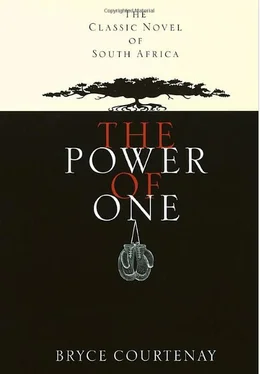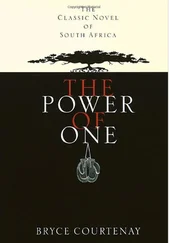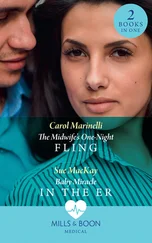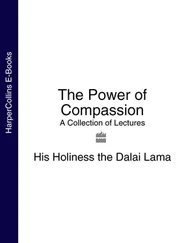Брайс Кортни - The Power of One
Здесь есть возможность читать онлайн «Брайс Кортни - The Power of One» весь текст электронной книги совершенно бесплатно (целиком полную версию без сокращений). В некоторых случаях можно слушать аудио, скачать через торрент в формате fb2 и присутствует краткое содержание. Жанр: Современная проза, на английском языке. Описание произведения, (предисловие) а так же отзывы посетителей доступны на портале библиотеки ЛибКат.
- Название:The Power of One
- Автор:
- Жанр:
- Год:неизвестен
- ISBN:нет данных
- Рейтинг книги:4 / 5. Голосов: 1
-
Избранное:Добавить в избранное
- Отзывы:
-
Ваша оценка:
- 80
- 1
- 2
- 3
- 4
- 5
The Power of One: краткое содержание, описание и аннотация
Предлагаем к чтению аннотацию, описание, краткое содержание или предисловие (зависит от того, что написал сам автор книги «The Power of One»). Если вы не нашли необходимую информацию о книге — напишите в комментариях, мы постараемся отыскать её.
The book is made to movie with the same name.
The Power of One — читать онлайн бесплатно полную книгу (весь текст) целиком
Ниже представлен текст книги, разбитый по страницам. Система сохранения места последней прочитанной страницы, позволяет с удобством читать онлайн бесплатно книгу «The Power of One», без необходимости каждый раз заново искать на чём Вы остановились. Поставьте закладку, и сможете в любой момент перейти на страницу, на которой закончили чтение.
Интервал:
Закладка:
Snotnose came over and said Doc wanted me. Gert told me he’d see me later in the gym. Doc had decided to play Chopin’s Nocturne No. 5, the same piece I had so unsuccessfully been coming to grips with for some weeks. I knew the music well enough to turn the pages for him and that’s why he had sent for me. Doc had agreed to play two pieces for the concert. When I had enquired about the second piece he had said it was to be a surprise and that after the Chopin nocturne I was to return to my seat beside Mrs Boxall.
The hall was almost full, and the warders and their wives and guests from the town had all taken their seats when the Kommandant walked to the front of the hall and stood beside the Steinway.
‘Dames and Here,’ he began, ‘it gives me much pleasure to welcome you all to this concert in honour of our good friend Brigadier Joubert, Transvaal Inspector of Prisons. The brigadier this very afternoon said nice things about Barberton prison and I just want to say to all my men that I am proud of you. Now it is our turn to say nice things about the brigadier who is a good kêrel and also a good revolver shot as some of us saw at the pistol range this afternoon. We thank him for his visit and,’ the Kommandant grinned, ‘for going so easy on us.’ The audience laughed and he continued, ‘No, seriously, man, it is men like Brigadier Joubert who make the South African Prison service a place where good men can hold their heads up high.’ He paused and seemed to be examining the large gold signet ring on his hand before looking up again. ‘The concert we held for the black prisoners last week, the brigadier was kind enough to say, was a good example of prison reform. It was just a little idea I had and it worked. But the brigadier is a man of big ideas that work, a big man who gives us inspiration and strength to continue.’ I could feel Mrs Boxall’s arm trembling against my own and I turned to see her trying very hard not to laugh. ‘He is a man of the Church, a God-fearing man and a man dedicated to the prison service.’ The audience broke out in spontaneous applause and the Kommandant let it go on for a moment before holding his hand up. ‘He is also a cultured man, which brings me to our first item on the programme for tonight.’ He cleared his throat and looked around. ‘All of you know that we have had in this prison as our guest,’ one or two titters issued from the audience and the Kommandant went on, ‘no, I mean it, man, as our honoured guest for the past four years, a man who is a musical genius. This is the last time we will hear him play for us. Last week he helped us with the prisoners’ concert and tonight he is giving a personal one just for us in Brigadier Joubert’s honour. I ask you now to welcome Professor Von Vollensteen.’ Doc rose and did a small bow to the audience and gave me a nod and with the applause continuing we moved over to the Steinway.
Doc lost no time getting started and the Kommandant was still on his way to his seat when the first notes of the Chopin nocturne filled the hall. At first the music was wonderfully relaxed, deceptively simple and straightforward and then, as the recital continued, the melody line became more and more ornamental.
Doc’s finger technique was remarkable as the delicate filigree writing for the right hand came into play. In the middle section the music became more and more complex, fast and urgent, leading to a long crescendo and frenzied climax where Doc could shake his head a lot and bang furiously at the keys which he knew the audience would like. The nocturne ended with an elegant descent in steps towards a rustling, almost muted final chord.
Doc had chosen well. Chopin’s Nocturne No. 5 is not difficult music to understand and it is very beautiful. The audience stood up, clapped and seemed very pleased. Doc rose and took a bow and nodded for me to return to my seat next to Mrs Boxall. Then he removed several sheets of music from inside his piano stool and fixed them carefully to the music rack. He turned to the audience and cleared his throat.
‘Ladies and gentleman. Tonight I would like to dedicate this next piece of music, which I have played once only before, to a friend, a very good friend. I have named this music by his name and it is for him. I give you, “Requiem for Geel Piet”!’
Without further ado Doc sat down at the Steinway and commenced to play the Concerto of the Great Southland which he had now renamed. The melodies of the tribal songs seemed to take over the hall, as the Ndebele song followed the Sotho with its more strident rhythm, Doc’s left hand taking the part of the solo high-pitched voice and the right chasing it as the singers themselves had done. The Swazi melody followed and then the Shangaan, each separated by the haunting refrain that carried a hint of each, yet acted to lead away from the one and into the other. Finally came the victory song of the great Shaka and the Steinway seemed to build the drama of the magnificent Zulu impi, the chords crashing as they marched into battle. The requiem closed with a muted and very beautiful compilation of the songs of the tribes. The music seemed to swell as all around us from the cells beyond the hall the voices came as the tribes completed the requiem. Geel Piet, who had had no tribe, whose blood was the mixture of all the people of Southern Africa – the white tribe, the Bushman, the Hottentot, the Cape Malay and the black tribal blood of Africa itself – was celebrated in death by all the tribes. He was the new man of Southern Africa, the result of three hundred years of torture, treachery, racism and slaughter in the name of one colour or another.
There was a special kind of silence as the performance ended. To our own was joined the silence of the listeners beyond the hall. We had all been a part of the lament for Africa. Requiem for Geel Piet was a lament for all of us, the tears shed for South Africa itself.
During the applause Brigadier Joubert, the Inspector of Prisons, rose from his seat and moved to the front of the hall. He raised his hands for silence and the hall grew quiet again. Taking a khaki handkerchief from his trouser pocket he slowly wiped his eyes and began to speak very emotionally.
‘Tonight, Dames and Here, we have heard a work of true genius. Whoever this Geel Piet was, we know from his name that he was an Afrikaner who is honoured by this music. He was also the spirit of Africa and as Afrikaners we should all honour him and his death.’ He folded the handkerchief neatly and put it back into the pocket of his tunic. ‘All I can say is that he must have been a great man for the professor to write a piece of music just for him. I now ask you all to stand and to bring your hands together once again for the professor.’ I saw that Captain Smit had a big smile on his face and was clapping madly. Even the Kommandant seemed to have decided to ignore the irony, he was clapping for all he was worth. I think he must have seen a colonel’s insignia on the lapel of his uniform in the very near future.
Doc stood with his head bowed throughout the brigadier’s speech and I could see that he had his bandanna out and was doing one of his sniffs into it. I knew he was crying for Geel Piet. But I also knew Geel Piet would have found this moment very funny.
‘Ag, man,’ he would have said, ‘why must a man always wait until he is dead for such a clever joke to heppen?’
Then the warders, wives and guests moved into the gym to watch the boxing exhibition. The chairs were being cleared from the hall to get ready for the Boere music and tiekiedraai which, with the braaivleis, were the highlight of the evening.
Captain Smit had worked out a routine for the boxing exhibition which was pretty clever. All the boxers were seated in a row facing the ring and he was in the ring with a whistle round his neck, acting as referee. When the audience had filled the gym he blew his whistle and I climbed into the ring with Snotnose. We shook hands and Captain Smit blew his whistle again and Snotnose and I started to box. The idea was that every round, one of the boxers would step down and another would replace him. As the youngest I stepped out first and Fonnie Kruger came in and boxed the next round with Snotnose. Then Maatie Snyman replaced Snotnose and fought Fonnie and then Fonnie stepped down and Nels Stekhoven came in and so on right up to the heavyweights, where Klipkop fought Gert and then as a joke I stepped in and fought the final round with Klipkop. It was a good way to entertain the crowd, as every boxer ended up fighting someone lighter and heavier than himself and we fought as hard as we could to give them a good show. It all went like clockwork and not a word was spoken by Captain Smit who just blew his whistle to start and stop a round. When I stepped into the ring with Klipkop the crowd cheered like mad and someone said, ‘Murder da bum, Peekay!’ and everybody laughed. I danced around Klipkop and gave him a terrible time, punching him in the solar plexus. He also attempted to take my head off with huge uppercuts, always missing by a mile. The crowd enjoyed it a lot and finally Captain Smit blew his whistle and held my hand up and there was a lot of cheering.
Читать дальшеИнтервал:
Закладка:
Похожие книги на «The Power of One»
Представляем Вашему вниманию похожие книги на «The Power of One» списком для выбора. Мы отобрали схожую по названию и смыслу литературу в надежде предоставить читателям больше вариантов отыскать новые, интересные, ещё непрочитанные произведения.
Обсуждение, отзывы о книге «The Power of One» и просто собственные мнения читателей. Оставьте ваши комментарии, напишите, что Вы думаете о произведении, его смысле или главных героях. Укажите что конкретно понравилось, а что нет, и почему Вы так считаете.












